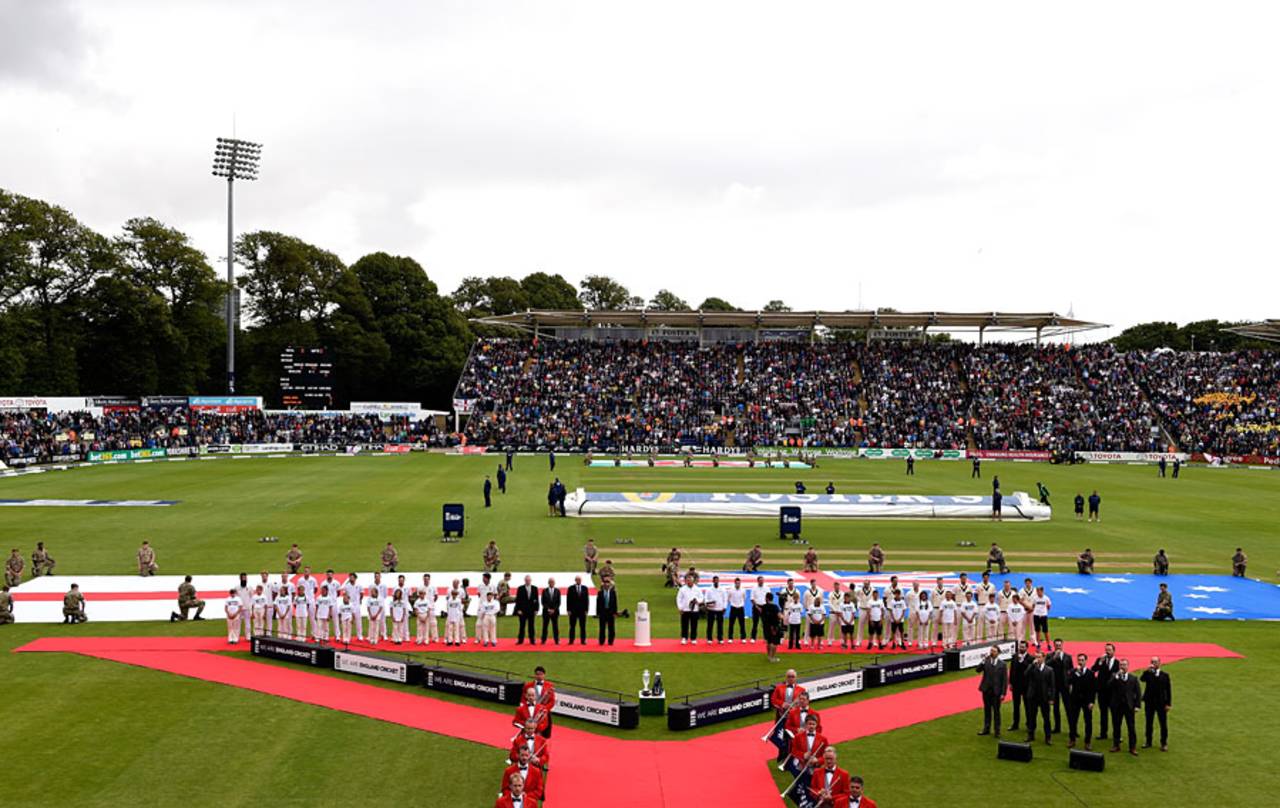Is cricket war?
Not when we last checked. So what's with all the nationalism?
Andrew Hughes
15-Jul-2015

When did cricket become a United Nations parade? • Getty Images
Viewers who switched on the coverage of the first Test from Cardiff at 11 o'clock last Wednesday might have been a little confused. Expecting smartly dressed cricketers strolling onto the immaculate turf to the accompaniment of polite applause, they were instead offered some vigorous flag-waving, an anthem-singing contest, a marching band and a fireworks display. It looked less like a cricket match and more like a rally for one of those dubious political parties whose leader eventually turns up in an undercover documentary professing an admiration for Josef Goebbels.
Perhaps the ECB, ever-vigilant when it comes to spotting a bargain, had heard about a special offer at World of Flags: buy one outsize St George flag and get a free flaming torch. But it felt wrong, and not just because all this pre-match paraphernalia caused a delay to the start of the very event to which it was supposed to draw our attention.
It felt wrong because cricket is a contest between bat and ball, not a contest between nations. Cricket predates both nationalism - in its virulent 19th-century form - and most of the nations that now play it.
As the history of the last 200 years demonstrates, nationalism's addictive qualities - an illusion of shared identity, grandiosity and an air of hysterical and aggressive triumphalism - can ensnare entire populations. It has parasitic tendencies too, inveigling itself into a sphere of human activity and then corrupting it from within. When India play Pakistan, for example, cricket is merely the passive host through which nationalism asserts itself.
In the case of cricket, nationalism infantilises one of the most sophisticated activities that humans have yet devised and turns a complex and subtle endeavour into a Tweedledee-versus-Tweedledum squabble: a matter of misplaced collective pride. It is possible to disagree with many aspects of George Orwell's famous essay, "The Sporting Spirit" but it is hard to argue with his identification of, "…the lunatic modern habit of identifying oneself with large power units and seeing everything in terms of competitive prestige".
Our sport is more than a tawdry tussle between nations to see which will earn a temporary, trivial advantage. CLR James demonstrated, in Beyond A Boundary that cricket is an art, a dramatic spectacle that '…belongs with the theatre, ballet, opera and the dance". If cricket is art, then viewing it in nationalistic terms is as absurd as going to an art gallery in order to cheer the Constables and boo the Monets, or attending a performance of Romeo and Juliet wearing a "Capulets Rule" T-shirt and heckling the Montagues.
Patriotism, which is not the same as nationalism, being a largely defensive sentiment, a love for a particular place and a particular way of life, rather than an assertion of the superiority of a large power block, comes to the fore when that place or way of life is under threat, and under such a threat even nationalism can serve a purpose in binding a large, disparate population together in a common cause.
But cricket is not war and England is not at war with Australia. So put down the flags, give "Jerusalem" a rest and allow our sport room to breathe, for it needs neither fireworks nor anthems, just a finely tended stage and an appreciative audience.
Andrew Hughes is a writer currently based in England. @hughandrews73